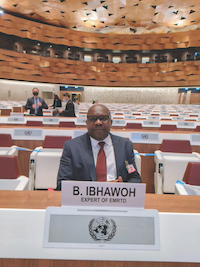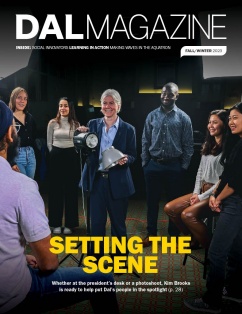Dr. Bonny Ibhawoh (PhD’03) is a Professor of International Human Rights at McMaster University with over three decades of research in the field of human rights and transitional justice. He draws attention to the fact many African and Asian voices and stories are under- represented in conversations around human rights.
Dr. Bonny Ibhawoh was already a burgeoning scholar and a teaching assistant at Bendel State University in Nigeria in the 1990s when the military regime that had overthrown the country’s democratically elected government turned even more repressive. This turn of events set his life on an altered course.
Nigeria’s military leaders considered universities hotbeds of a pro-democracy movement and closed several universities, including Bendel State (now called Ambrose Alli) University, and Dr. Ibhawoh’s work was suddenly halted. He took what he thought would be a temporary leave from his native country, and headed to the UK to become a research fellow with the Danish Institute for Human Rights.
“1994 was a defining year for me,” he says, explaining that he intended to do human rights research and scholarship, then return home. But Dr. Ibhawoh discovered he could be more useful to Nigeria from afar, writing reports and working with NGOs and pro- democracy groups. He’s never moved back.
Discovering A Vibrant Community at Dal
He came to Dalhousie as a Killam Scholar in the late 1990s, saying he was offered an opportunity to be part of a vibrant intellectual community engaged in innovative scholarship. “I found an interdisciplinary community of students and faculty interested in international studies that provided space for debates about human rights.”
In the second year of his PhD, he was appointed “residence don” (a role model providing support to the King's residence community) of Cochran Bay at the University of King’s College. “The opportunity to live on campus and mentor undergraduate students greatly enriched my experience.”

In the years since he graduated from Dal, Dr. Ibhawoh has become one of the world’s leading historians and scholars on universal human rights from a global perspective, and restorative justice, writing nine books and countless journal articles. He has held the professorial Chair in Global Human Rights at McMaster University and has been director of the university’s Centre for Human Rights and Restorative Justice. He recently renewed a three-year term as chair of the UN Expert Mechanism on the Rights to Development and is a Fellow of the Royal Society of Canada. Through it all, he has worked tirelessly to change the discourse around human rights globally so that it includes everybody.
European, Colonial and imperial states do not have exclusivity over human rights, he argues, and he’s spent years drawing attention to the fact African and many Asian voices and stories are under-represented in conversations around human rights. “My critique,” he says, “is that the human rights doctrine must be universal to command legitimacy.”
‘Discourse Of the West’
His goal is to bring oft-ignored perspectives into big debates of human rights, which he says have been disproportionately centred around the United Nations (UN) Universal Declaration of Human Rights, adopted in 1948. Written after and largely in response to WWII, the UN’s Declaration on other early international human rights principles were inspired mostly by Western liberal traditions, says Dr. Ibhawoh. While these principles are important for promoting human rights, they should not be seen as gold standards. He calls international human rights “work in progress enriched by humanistic ideas across the world.”
“It came to be seen that certain regions of the world are custodians of human rights,” Dr. Ibhawoh says. He laments that the discipline has been exclusionary and is relentless in his drive to make it, and human rights practice, more inclusive and empathetic.
“I worry that the world, that society, has become too individualistic,” says Dr. Ibhawoh. “We need to recall a little bit of collective humanity.”
The Right to Participate In, Contribute To, And Enjoy Development
As a UN advisor, one doctrine he champions is the United Nations Declaration on the Right to Development. It affirms, he explains, the right of individuals and groups to participate in, contribute to, and enjoy development. When asked to break that down into what it means in practical terms, Dr. Ibhawoh offers contemporary examples including COVID and climate change.
With COVID, he says the application of the right to development framework could be in the fair distribution of vaccines globally. If certain countries are hoarding vaccines, it makes citizens in other countries more vulnerable to disease. And as we saw during the pandemic, one variant from a country that is under- vaccinated can have a global impact.
Regarding climate change, Dr. Ibhawoh questions what obligations countries who have already been through industrial revolutions have to help countries not there yet. Once again, standards set in more industrially advanced nations can’t be equitably and universally applied to all.
Providing Space for Debate
He says academics and intellectuals do have a role in the great debates of our time, and he says it’s his job to provide context for them, often through a historical lens. “It’s the privilege of academics who have been trained and schooled to provide a space for debate, and to make evidence-informed arguments.”
Dr. Ibhawoh is also a lifelong advocate for increasing public participation in matters of political discourse and creation of policy and has furthered this through creation of Participedia, a crowd-sourced, open-access web platform. Calling it “Wikipedia for political participation,” he says even during the pandemic when people worldwide were largely confined to their homes, they could participate in information collection through Participedia submissions and retrievals over their phones in real time.
At the heart of Dr. Ibhawoh’s soaring career and significant contribution to human rights and legal scholarship is his belief in Ubuntu—an African word meaning ‘humanity to others.’ It is described as reminding us ‘I am what I am because of who we all are’ or more simply, ‘I am because we are.’ It describes the universal bond of sharing that connects all humanity.
“A person is a person through other people,” says Dr. Ibhawoh. He says he works to establish middle ground in a polemical world. “Not being too ideological but finding a space for debate,” is how he describes it.
As to what propels him the most? “Our global cause. We’re all in this together.”
This story appeared in the DAL Magazine Fall/Winter 2023 issue. Flip through the rest of the issue using the links below.


